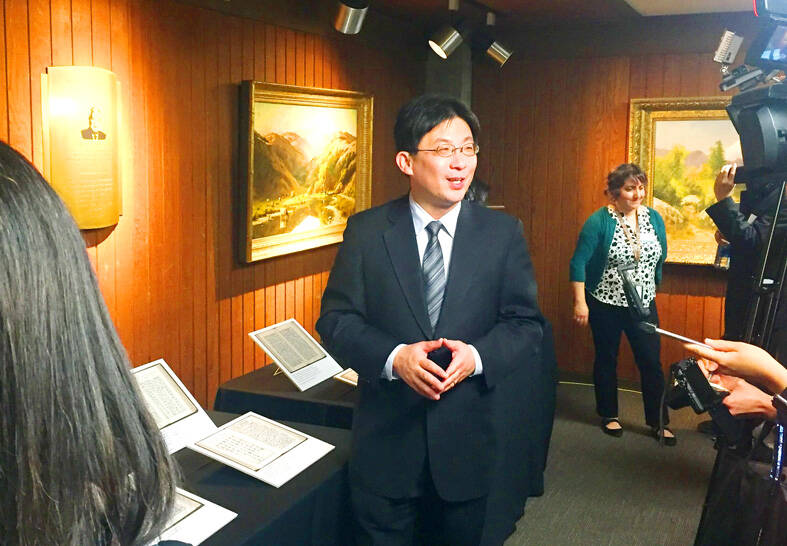A US court has awarded Academia Historica ownership of the diaries of former presidents Chiang Kai-shek (蔣介石) and Chiang Ching-kuo (蔣經國), ending a decade-long legal battle and setting up their return to Taiwan later this year.
The ruling on the documents, which are currently housed at Stanford University’s Hoover Institution, was made on Tuesday last week by the US District Court in San Jose, California, the San Francisco Standard reported on Tuesday.
The dispute dates back to 2005, when Chiang Ching-kuo’s daughter-in-law Chiang Fang Chih-yi (蔣方智怡) signed an agreement for the Hoover Institution to curate the diaries for 50 years.

Photo: CNA
After receiving conflicting claims of ownership to the diaries, Stanford University filed an interpleader action in the US in 2013 to determine who had legal rights to the documents.
Later that year, when several members of the Chiang family transferred ownership of the diaries to Academia Historica, Taiwan’s state archives, the institution was added to the university’s inquiry.
In 2015, the US court ruled that Academia Historica should first launch a legal inquiry into the diaries’ ownership in Taiwan, where most of the litigants are located.
Following a multiyear trial, the Taipei District Court in 2020 ruled that the diaries dating from the Chiangs’ time in office were the property of the state, while all other files belonged to the Chiang family.
That decision was upheld on appeal last year by the High Court and was recognized by the US court in its ruling last week.
While the rulings could have led to the documents being split up, several members of the Chiang family who had claimed the diaries agreed after the trials in Taiwan to donate them to the archives. Chiang Ching-kuo’s granddaughter Chiang Yo-mei (蔣友梅) was the last family member to reach an agreement in May.
Academia Historica President Chen Yi-shen (陳儀深) told the Central News Agency that the archives had recently sent two experts to take an inventory of the documents, which include the personal diaries of Chiang Kai-shek from 1917 to 1972 and Chiang Ching-kuo from 1937 to 1979, as well as copies of their speeches and diplomatic correspondence.
Once the inventory is completed, the collection will most likely be shipped to Taiwan before the end of the year, Chen said.
In terms of the collection’s content, Chen said he was planning to publish at the end of October an “especially valuable” portion of Chiang Kai-shek’s diary, covering his first term as president from 1948 to 1954.
While Chiang Ching-kuo’s diaries only run through the end of 1979, Chen said the portions from 1977 to 1979 — which include the period when the US switched diplomatic recognition to Beijing — are already available in Academia Historica’s online database.
Asked if the diaries would be displayed in public, Chen was noncommittal, saying his first priority was to make them available to academics, and, in the longer term, have them uploaded into the archives’ presidential database.

MAKING WAVES: China’s maritime militia could become a nontraditional threat in war, clogging up shipping lanes to prevent US or Japanese intervention, a report said About 1,900 Chinese ships flying flags of convenience and fishing vessels that participated in China’s military exercises around Taiwan last month and in January last year have been listed for monitoring, Coast Guard Administration (CGA) Deputy Director-General Hsieh Ching-chin (謝慶欽) said yesterday. Following amendments to the Commercial Port Act (商港法) and the Law of Ships (船舶法) last month, the CGA can designate possible berthing areas or deny ports of call for vessels suspected of loitering around areas where undersea cables can be accessed, Oceans Affairs Council Minister Kuan Bi-ling (管碧玲) said. The list of suspected ships, originally 300, had risen to about

DAREDEVIL: Honnold said it had always been a dream of his to climb Taipei 101, while a Netflix producer said the skyscraper was ‘a real icon of this country’ US climber Alex Honnold yesterday took on Taiwan’s tallest building, becoming the first person to scale Taipei 101 without a rope, harness or safety net. Hundreds of spectators gathered at the base of the 101-story skyscraper to watch Honnold, 40, embark on his daredevil feat, which was also broadcast live on Netflix. Dressed in a red T-shirt and yellow custom-made climbing shoes, Honnold swiftly moved up the southeast face of the glass and steel building. At one point, he stepped onto a platform midway up to wave down at fans and onlookers who were taking photos. People watching from inside

Japan’s strategic alliance with the US would collapse if Tokyo were to turn away from a conflict in Taiwan, Japanese Prime Minister Sanae Takaichi said yesterday, but distanced herself from previous comments that suggested a possible military response in such an event. Takaichi expressed her latest views on a nationally broadcast TV program late on Monday, where an opposition party leader criticized her for igniting tensions with China with the earlier remarks. Ties between Japan and China have sunk to the worst level in years after Takaichi said in November that a hypothetical Chinese attack on Taiwan could bring about a Japanese

The WHO ignored early COVID-19 warnings from Taiwan, US Deputy Secretary of Health and Human Services Jim O’Neill said on Friday, as part of justification for Washington withdrawing from the global health body. US Secretary of State Marco Rubio on Thursday said that the US was pulling out of the UN agency, as it failed to fulfill its responsibilities during the COVID-19 pandemic. The WHO “ignored early COVID warnings from Taiwan in 2019 by pretending Taiwan did not exist, O’Neill wrote on X on Friday, Taiwan time. “It ignored rigorous science and promoted lockdowns.” The US will “continue international coordination on infectious